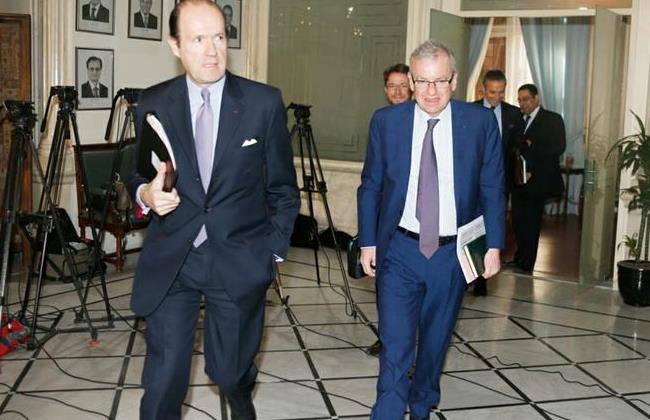Inter-Christian divides blamed for presidential standoff
Antoine Ghattas Saab/The Daily Star/Feb. 09, 2015
The latest flurry of foreign diplomatic activity designed to break Lebanon’s 8-month-old presidential stalemate has failed to produce any tangible results, raising fears that the country’s top Christian post will remain vacant for quite some time, political sources said. The most recent senior foreign official to visit Lebanon in an attempt to resolve the presidential crisis was French presidential envoy Jean-Francois Girault, who ended a two-day trip to Beirut Thursday, without making any progress in his talks with rival Lebanese leaders that would set the stage for the election of a new president.
While the presidential standoff has defied local, regional and international initiatives, the foreign envoys that visited Lebanon recently and held talks with Lebanese leaders have blamed political disputes among the country’s main Christian parties for the deadlock, the sources said. “Every foreign envoy who visited Lebanon and met with officials here had prepared a report [to his government] by adding a clause saying: ‘The [presidential] obstacle lies in inter-Christian differences,’” according to the sources.
The ambassador of an Arab country, which currently wields great influence in Lebanon, said during a social function a few days ago that the election of a successor to former President Michel Sleiman, whose six-year term ended May 25, should take place in the next three months “because the situation can no longer endure this vacancy in the state’s highest level post.”The ambassador said he believed that Iran, which has a say in the presidential election, has mandated the presidential crisis to Hezbollah, an organization skillful in arranging its cards and bargaining over them.
Since Hezbollah is adamant on its support for Free Patriotic Movement leader MP Michel Aoun for the presidency and “will not accept another candidate” as Mahmoud Qmati, a member of Hezbollah’s political bureau, declared after visiting Aoun at his residence in Rabieh Friday, this certainly signals that the presidential vote has been put on hold.
According to the ambassador, international efforts have been intensified to try to resolve the presidential crisis, given the importance of the election of a president in this fateful period. Although the Americans agree with the Russians, Saudis, French and Iranians on this point in particular, the ambassador said that so far “the result is zero,” adding that all the diplomatic activity was merely exploratory to probe the parties’ intentions and sound out their views on how to break the deadlock.
For his part, a diplomat described the latest French activity over the presidential election as an attempt by Paris to reassert its presence in Lebanon, but this activity cannot be translated into the situation on the ground. France has been trying to regain some of the role it has lost at the peak of American and Russian activity across the region, while America is mainly concerned with mobilizing the world in the fight against ISIS terrorism, and Iran is active in strengthening its influence in the Middle Eastern arena, the diplomat said.
A Lebanese politician who had the chance to meet Girault told The Daily Star that the French activity over Lebanon focused chiefly on prodding the Lebanese factions to decide upon a president and that the decision-making countries have kicked the presidential ball into their court. Girault, according to the politician, voiced his concern over the considerable danger facing Lebanon in light of the Christians’ reluctance to play their main role in their country. There is no doubt that the Lebanese presidency has become tied to international decisions that are fluctuating during the course of negotiations over both Iran’s nuclear program and the proposed solutions to the region’s crises, the politician said.
On the eve of a reported meeting between Girault and Maronite Patriarch Beshara Rai in Rome, sources close to Bkirki, the seat of the Maronite patriarchate, said that Pope Francis told Rai during their meeting Friday that the Vatican was continuing in its efforts to encourage the Big Powers to exert pressure on regional parties to facilitate the presidential election. The Holy See does not have any preference in the names of presidential candidates and the Vatican’s contacts are particularly focused on the American side, which currently has strong cards in its ongoing negotiations with Iran over its nuclear program, the sources said.




















